The year is six weeks old already, and a blog post is long overdue. I blame it on the PhD: I’ve spent most of the past six weeks preparing for my confirmation panel next month. Still, I did manage to get in some great reading over the summer — none of it crime fiction. I didn’t plan it that way, but I usually end up setting aside one month each year to be crime-free, so to speak, and this year, January was it.
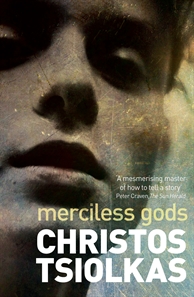 First up was Christos Tsiolkas’s short story collection, Merciless Gods (2014), which I finished over the new year. In fact, the first fiction I read in 2015 was ‘Saturn Return’, a story told from the point of view of a young man travelling from Melbourne to Sydney with his partner, Barney, to be with Barney’s father when he dies. En route, they visit the remnants of the migrant camp at Bonegilla, ‘a hateful place’ where the narrator’s father had been sent after migrating to Australia. The story was so moving, it made me cry. A great start to the new reading year!
First up was Christos Tsiolkas’s short story collection, Merciless Gods (2014), which I finished over the new year. In fact, the first fiction I read in 2015 was ‘Saturn Return’, a story told from the point of view of a young man travelling from Melbourne to Sydney with his partner, Barney, to be with Barney’s father when he dies. En route, they visit the remnants of the migrant camp at Bonegilla, ‘a hateful place’ where the narrator’s father had been sent after migrating to Australia. The story was so moving, it made me cry. A great start to the new reading year!
‘Saturn Return’ is only one of many riveting stories in this collection. Normally, I dip in and out of short story collections, but this is one I read cover to cover. Hypnotic.
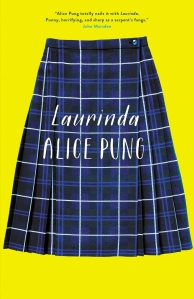 Next up, Laurinda (2014) by Alice Pung. Set in an exclusive girls’ school, Laurinda is narrated by Lucy Lam in the form of a conversation with her alter-ego, Linh. Lucy/Linh is Laurinda’s inaugural ‘Equal Access’ scholarship recipient, and the novel covers her experience of Year 10, her first year at the school, as she tries to fit in without losing herself.
Next up, Laurinda (2014) by Alice Pung. Set in an exclusive girls’ school, Laurinda is narrated by Lucy Lam in the form of a conversation with her alter-ego, Linh. Lucy/Linh is Laurinda’s inaugural ‘Equal Access’ scholarship recipient, and the novel covers her experience of Year 10, her first year at the school, as she tries to fit in without losing herself.
The prospect of reading a novel set in an exclusive girls’ school wouldn’t normally excite me, but Pung turns this into a meditation on class, race and power that is sharp and satisfying. Plus her prose makes me swoon. A novel that will appeal equally to young adults and not so young adults alike.
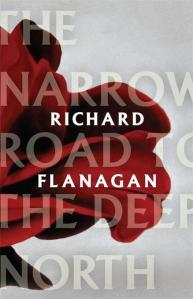 The Narrow Road to the Deep North (2013) is a novel I bought about a year ago on the recommendation of Kirsten Krauth, who spotted its brilliance long before it won a swathe of awards, including the 2014 Man Booker Prize — a worthy winner in my opinion.
The Narrow Road to the Deep North (2013) is a novel I bought about a year ago on the recommendation of Kirsten Krauth, who spotted its brilliance long before it won a swathe of awards, including the 2014 Man Booker Prize — a worthy winner in my opinion.
The central character is Dorrigo Evans, a doctor in the Australian army, who is taken prisoner by the Japanese during World War, and sent to the notorious Death Railway camp in Thailand. The story interweaves this horrific experience — told from the point of view of Dorrigo and fellow Australian prisoners, as well as the Japanese camp commander Major Nakamura, and his superior Colonel Kota — with a love story that precedes the war, and an account of both Dorrigo and Nakamura’s post-war lives.
A number of readers I know concurred that the novel gets off to a slow start before hitting a point where it’s hard to put down. I found myself coming to the end of a long reading session, only to realise I’d been holding my breath.
This novel ticked all my boxes: heart-stopping, intelligent, innovative and deeply moving. I can’t believe it took me so long to get around to reading it.
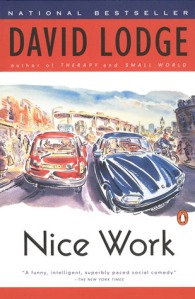 My other fiction read of the last six weeks is Nice Work (1988) by David Lodge. I also read Lodge’s wonderful work of literary criticism, The Art of Fiction, over the summer (a great resource for writers) and I was at a point in my PhD research where I needed to escape into fiction without straying too far. Nice Work is a novel about the relationship between Dr Robyn Penrose, a feminist lecturer of English literature theory at the fictional Rummidge University, and Victor Wilcox, Managing Director of a struggling engineering plant. The two meet through a PR exercise designed to bring the Industry and the University closer at the time, under Thatcher, when both the Industry and the University are threatened by government cuts and the rising power of financial services industries.
My other fiction read of the last six weeks is Nice Work (1988) by David Lodge. I also read Lodge’s wonderful work of literary criticism, The Art of Fiction, over the summer (a great resource for writers) and I was at a point in my PhD research where I needed to escape into fiction without straying too far. Nice Work is a novel about the relationship between Dr Robyn Penrose, a feminist lecturer of English literature theory at the fictional Rummidge University, and Victor Wilcox, Managing Director of a struggling engineering plant. The two meet through a PR exercise designed to bring the Industry and the University closer at the time, under Thatcher, when both the Industry and the University are threatened by government cuts and the rising power of financial services industries.
Nice Work is engaging, witty and unpredictable, and has the added bonus of explaining aspects of literary theory, making me feel that, although I was reading it for pleasure, I could count it as study. Satisfying on both counts.
I read a hell of a lot of academic writing over the summer, too, but I’ll spare you those details. As for my current read, it’s a thriller with a twist. But more on that later…hopefully within the next six weeks.

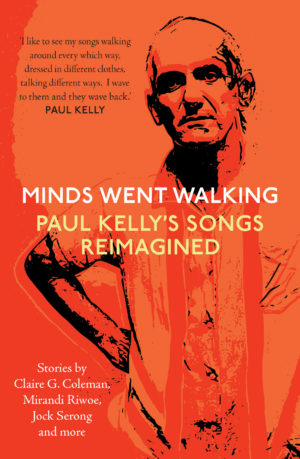
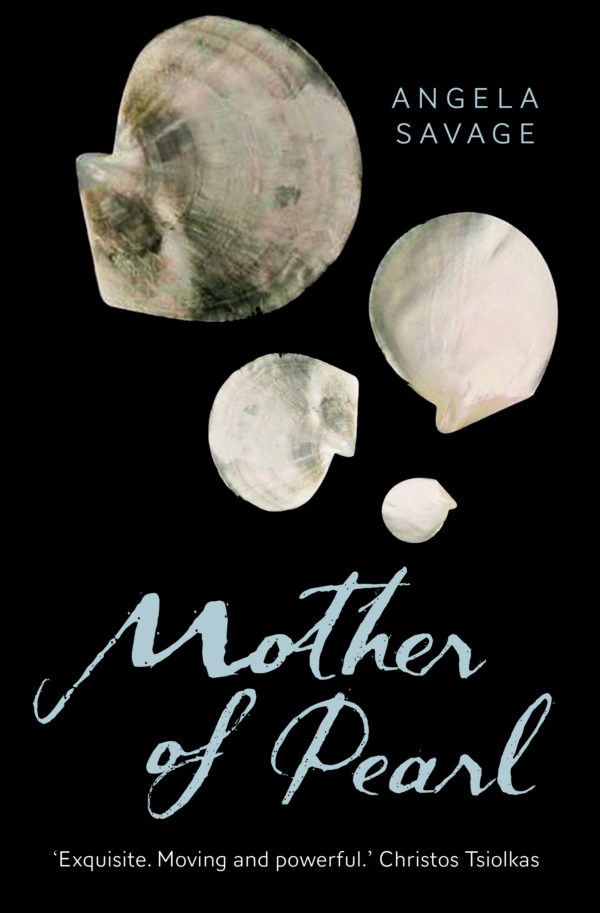
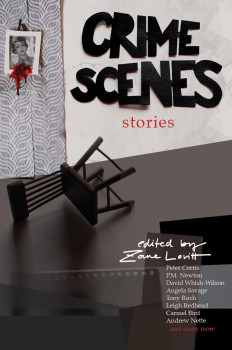



Ah, I remember getting ready for my panel. It’s nerve-wracking, but I know you’ll do well. I’ll be sending you lots of good wishes and positive vibes. In the meantime…thanks for sharing the reads you’ve enjoyed thus far this year. I keep hearing about The Narrow Road…., ‘though I’ve not yet read it myself. Perhaps I ought to.
LikeLiked by 1 person
Thanks for your good wishes and positive vibes, Margot. And do consider The Narrow Road…. It’s a remarkable book.I was interested in the Burma Railway because of its links to Thailand, having set parts of The Half-Child in Kanchanaburi province, where the railway line was built. In fact, there is very little about Thailand as such in the novel, but there are some wonderful observations on culturally different (and opposed) systems of belief and their consequences for understanding one another.
LikeLiked by 1 person
I’m going to get Nice Work—never heard of this writer before, so thank you. And I’m looking forward to Alice Pung’s book. She is indeed a terrific writer.
LikeLiked by 1 person
I think you’ll really enjoy David Lodge, Caron. I’m going to look up more of his work. And I agree with you about Alice Pung’s writing.
LikeLiked by 1 person
Haven’t read any David Lodge for years, thanks for reminding me about him, Angela! Will download now …
LikeLike
Enjoy, Fe!
LikeLike
Great to hear from you. I know you’ll do very well on the panel and send best wishes for that.
Am on overload with the TBR list and more books keep showing up here, and I promised myself that I’d stick to books I have or ones that show up and not get any more.
Look forward to more book reviews, and trust that Jayne is having a nice rest between
murder investigations.
LikeLiked by 1 person
Thanks Kathy. Great to hear from you, too. Good luck conquering that TBR mountain. And yes, Jayne is enjoying a break for now…but not forever!
LikeLike
Indeed best wishes for your confirmation panel.
I love Alice Pung – love hearing her talk, lover her writing…but I’m afraid I’m still scarred by my own all girls school experience – I always think I’m over it but I actively avoid any situations in which I might be prompted to remember (I spent a good part of last year beating the 25 year reunion people away with large sticks) – so I shall skip this one despite your recommendation
LikeLiked by 1 person
Oh, Bernadette, I’m sorry to hear about those scars. It’s astonishing how profoundly those few years can affect us, the experience reverberating throughout our adult lives. I totally respect your decision not to go there with Laurinda, though I would add that it just might help put some of what you went through into a more manageable perspective. It certainly made me feel better about not being on the A-list at my all-girls high school.
LikeLike
Enjoyed your reviews Angela, thanks. I’ve been a fan of David Lodge for a long time and I’m now off to buy a copy of Alice Pung’s book, after reading your review. Just started to read Richard Flanagan’s masterpiece so I’ll keep an eye on my breathing rate…Heather
LikeLiked by 1 person
Thanks for dropping by, Heather. I do hope you will enjoy Alice’s book. I think she is such a great writer. And I will be seeking out more of David Lodge.
LikeLike